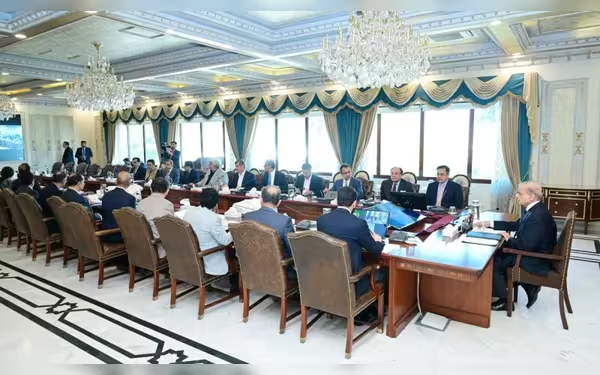Sunday, November 24, 2024 08:05 AM
PM Shehbaz Reviews Economic Situation Amid IMF Talks
- PM Shehbaz optimistic about economic stability.
- Inflation rate decreased from 38% to 7%.
- Government prioritizes public relief and tax compliance.
 Image Credits: brecorder
Image Credits: brecorderPM Shehbaz reviews economic situation and IMF talks, highlighting inflation drop and commitment to public relief.
In recent developments, Prime Minister Shehbaz Sharif was briefed on the ongoing discussions with the International Monetary Fund (IMF) during a meeting held on Monday. The Ministry of Finance provided an overview of the current economic situation in Pakistan, highlighting key indicators and the pressing issue of inflation. This meeting, chaired by PM Shehbaz, aimed to assess the country’s economic health and the measures being taken to combat tax evasion.
According to a statement from the Prime Minister’s Office (PMO), PM Shehbaz expressed optimism about the country’s economic trajectory. He stated, “The country is on the path to economic stability,” emphasizing that the steps taken to foster economic growth have resulted in a positive trend in the stock market. The Prime Minister noted that foreign investors are increasingly showing confidence in the government’s policies, which is a promising sign for the nation’s economy.
During the meeting, PM Shehbaz underscored the importance of prioritizing public relief. He assured attendees, “We are making every possible effort to fulfill promises made to the public.” The Prime Minister also shared encouraging statistics, revealing that the inflation rate has significantly decreased from 38% last year to 7%. Additionally, he mentioned that the interest rate has been reduced from 22% to 15%, stating, “The reduction in interest rates will boost business activity and create new employment opportunities.”
Furthermore, PM Shehbaz commended the Chief Minister of Punjab and the provincial government for their reforms in the agricultural sector, which are crucial for enhancing productivity and ensuring food security. He stressed the need for intensified actions against tax defaulters, declaring, “We will ensure that tax evaders and their facilitators are held accountable.” This commitment reflects the government’s determination to enhance tax compliance and bolster the economy.
Attending the meeting were several federal ministers, including Muhammad Aurangzeb, Ahsan Iqbal, and Musadik Malik, among others. Their collective insights are expected to play a vital role in shaping the government’s economic strategies moving forward. Last week, an IMF staff-level delegation, led by mission chief Nathan Porter, visited Pakistan to discuss the $7 billion Extended Fund Facility (EFF) programme. This visit is particularly noteworthy as it comes shortly after the IMF approved a bailout for Pakistan, a rare occurrence that highlights the urgency of the situation.
On Sunday, Finance Minister Muhammad Aurangzeb, in a recorded video statement, indicated that there would not be any new revenue measures introduced. He emphasized the importance of compliance and enforcement, stating, “We are going to be very firm on compliance and enforcement.” This approach suggests that all sectors will need to contribute to the country’s economic recovery.
The discussions in Islamabad are crucial as they precede the first review of Pakistan’s reforms, which is scheduled for the first quarter of 2025. As the government navigates these challenging economic waters, the focus remains on implementing effective policies that not only stabilize the economy but also provide relief to the public. The path ahead may be fraught with challenges, but with a concerted effort from all stakeholders, there is hope for a brighter economic future for Pakistan.













